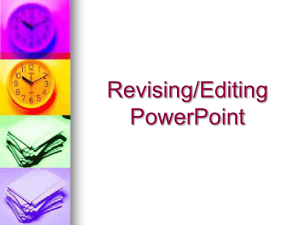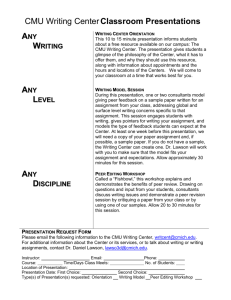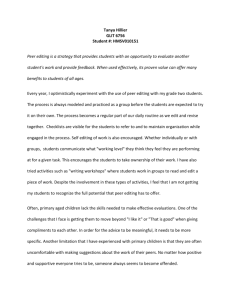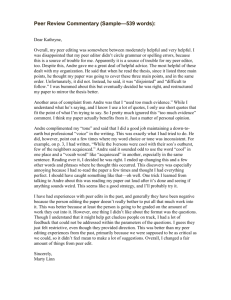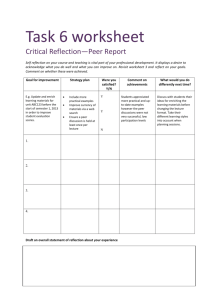Words Revising Words: A Modified Delphi Peer
advertisement
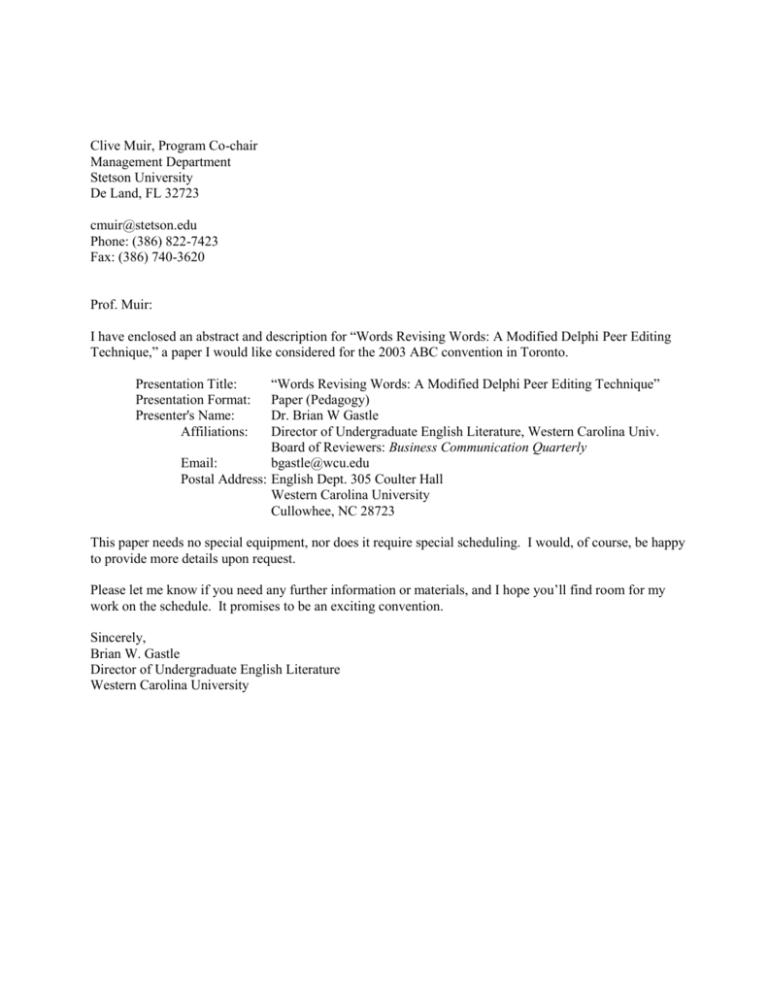
Clive Muir, Program Co-chair Management Department Stetson University De Land, FL 32723 cmuir@stetson.edu Phone: (386) 822-7423 Fax: (386) 740-3620 Prof. Muir: I have enclosed an abstract and description for “Words Revising Words: A Modified Delphi Peer Editing Technique,” a paper I would like considered for the 2003 ABC convention in Toronto. “Words Revising Words: A Modified Delphi Peer Editing Technique” Paper (Pedagogy) Dr. Brian W Gastle Director of Undergraduate English Literature, Western Carolina Univ. Board of Reviewers: Business Communication Quarterly Email: bgastle@wcu.edu Postal Address: English Dept. 305 Coulter Hall Western Carolina University Cullowhee, NC 28723 Presentation Title: Presentation Format: Presenter's Name: Affiliations: This paper needs no special equipment, nor does it require special scheduling. I would, of course, be happy to provide more details upon request. Please let me know if you need any further information or materials, and I hope you’ll find room for my work on the schedule. It promises to be an exciting convention. Sincerely, Brian W. Gastle Director of Undergraduate English Literature Western Carolina University 50-Word Abstract This paper describes a method of peer editing that uses a modified Delphi group dynamic. This method can help business writing students improve their writing, allow the students to address and avoid some of the pitfalls associated with traditional peer editing techniques, and help the professional writing instructor manage his or her course effectively and professionally. Description Words Revising Words: A Modified Delphi Peer Editing Technique Teachers of professional and business writing have long recognized the value of having students read and comment on each other’s work. But often they are equally discouraged by this practice because of the complications that arise, primarily those caused by a host of group dynamics issues. Relying on a long history of research devoted to the Delphi technique (a method used in businesses and the government to develop and generate ideas while avoiding some of those very issues of group dynamics), this paper describes a method of peer editing in professional and business writing classes that can 1) help students improve their writing, 2) allow the students to address and avoid some of the pitfalls associated with participatory work groups and small group dynamics, and 3) help the professional writing instructor manage his or her course effectively and professionally. Traditionally, peer editing in professional and business writing classes has usually been conducted one of two ways. Either the students discuss each other’s writing in small groups orally, or they combine this method with a set of written comments that a peer provides to a writer individually. Unfortunately, these methods can lead to a number of fairly common problems, including problems like filtering, selective perception, group shift, and group think. One of the ways that private business and the government have addressed these problems is to ask groups to conduct idea generation and development via the Delphi method. This method requires participants to write in suggestions, and then a moderator attempts to synthesize recommendations. This synthesis is then redistributed for further recommendations until a consensus is reached. While this method would be difficult to emulate in a class period, I have applied a modified form successfully in professional writing classes for a number of years In the Modified Delphi Peer Editing Technique, students exchange documents and write their comments on the author’s work. Then, the documents are exchanged again and the process is repeated, with one additional requirement: the peer must now comment on both the original work and the previous set of comment(s). All suggestions are written; no verbal comments or clarifications are allowed. This process is repeated as time allows, allowing for multiple comments and a running commentary on those comments. While this may seem like a simple technique, it has been extremely effective at curbing the aforementioned group dynamics problems. For the student writer, it provides a set of written comments that are themselves evaluated by others (a “process” issue”). For the peer commentators, it allows them to develop their own reading and editing skills by providing a running commentary on revision recommendations and requiring them to merely write more about writing (a “product” issue). And finally, the professional writing instructor can 1) use the comments as a writing assignment in and of itself, 2) be assured of peer editing that focuses on the writing (rather than on the myriad distractions that verbal peer editing often produces), and 3) use the comments in support of his or her final evaluation of the students’ documents.
